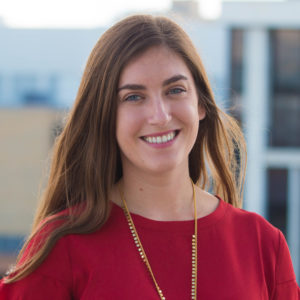


Megan joins the USGLC from the Capitol Hill office of Congressman Mike Thompson (D-CA), where she most recently served as the Press Secretary. Prior to managing communications for the Congressman, Megan was a Legislative Aide responsible for a varied legislative portfolio. She spent a year studying in Madrid, Spain before earning her B.A. in Political Science, with an emphasis in International Relations, and a Minor in Spanish from the University of California, Santa Barbara. A California native, Megan misses the beaches of Santa Barbara, though she has enjoyed making DC her new home.
Ridding the world of modern slavery and human trafficking will require a coordinated and sustained global effort – an effort that has already attracted an unlikely cast of champions – from Republicans and Democrats in the House and Senate to West Wing advisors and Hollywood celebrities.
A staggering 25 percent of the global population is now between the ages of 10 and 24. And while meeting the needs of an outsized youth population would be a challenge for any country, the majority of the world’s young people are concentrated in resource-strapped nations. As this so-called “youth bulge” continues to grow, developing countries will need the support of developed nations and private organizations to ensure every young person has the chance to become a self-sufficient adult. International non-profit Global Communities is working alongside the U.S. Agency for International Development (USAID) to make sure today’s youth have the foundation they need to lead healthy, happy lives.
Eleven-year-old Amisa was the first to contract malaria, and her younger sisters fell ill soon after. But the girls were lucky – their mother was able to bring them to a local hospital where they were tested and treated for the disease...
Just last year, Gap Inc. partnered with the U.S. Agency for International Development (USAID) to launch the Women + Water Alliance in India, a collaboration to improve and sustain the health and well-being of women and communities touched by the apparel industry. By incorporating lessons on safe sanitation and hygiene practices, as well as building communication and advocacy skills, P.A.C.E. is empowering women and girls with the knowledge and resources they need to drive change in their communities.
Fifteen years ago, President George W. Bush announced the launch of PEPFAR – the President’s Emergency Plan for AIDS Relief – during his State of the Union address, declaring that “this nation can lead the world in sparing innocent people from a plague of nature.” With an AIDS-free generation finally within sight, we cannot afford to scale back our investments in PEPFAR’s lifesaving work.
With time running out for Congress to meet a midnight funding deadline, the possibility of a government shutdown looms large. And though many in Washington are holding out hope for a last-minute deal to keep the government open, it’s worth taking a look at how a shutdown would impact America’s diplomatic and development programs overseas.
For the women of the Maasai communities, life may be simple, but it’s far from easy. According to Teresia, one of the senior Maasai “mamas,” the greatest challenge facing her boma “was the darkness in our houses” because without electricity, “you can’t see anything at night.” Across sub-Saharan Africa, two out of three people live off the electrical grid – that’s 70 percent of the entire population, or 600 million people.
2017 brought a steady stream of challenges and changes to U.S. foreign policy and development assistance – from a new Administration taking the reins, to a budget proposal that sent shockwaves through Washington, to a steady drumbeat of support for American global leadership. We’ve gathered 12 of the top stories from the past year – one from each month – that you won’t want to miss.
For Violet and her classmates in Tanzania, lunchtime means sitting under the shade of nearby trees, happily devouring a hearty bowl of rice and beans. In the rural Mara region where Violet lives with her family, school meals like these were once a rare occurrence. Recurrent droughts in the region made farming difficult and food scarce — and until Project Concern International (PCI) stepped in, hunger was commonplace in the classroom.
While all eyes are on President Trump’s whirlwind 12-day, 5-country tour of Asia, there’s been another narrative is playing out across the Indian Ocean: China’s growing influence in Africa.
Get the latest news, advocacy, and event updates from the USGLC
Copyright 2025 USGLC | Privacy Policy
Notifications